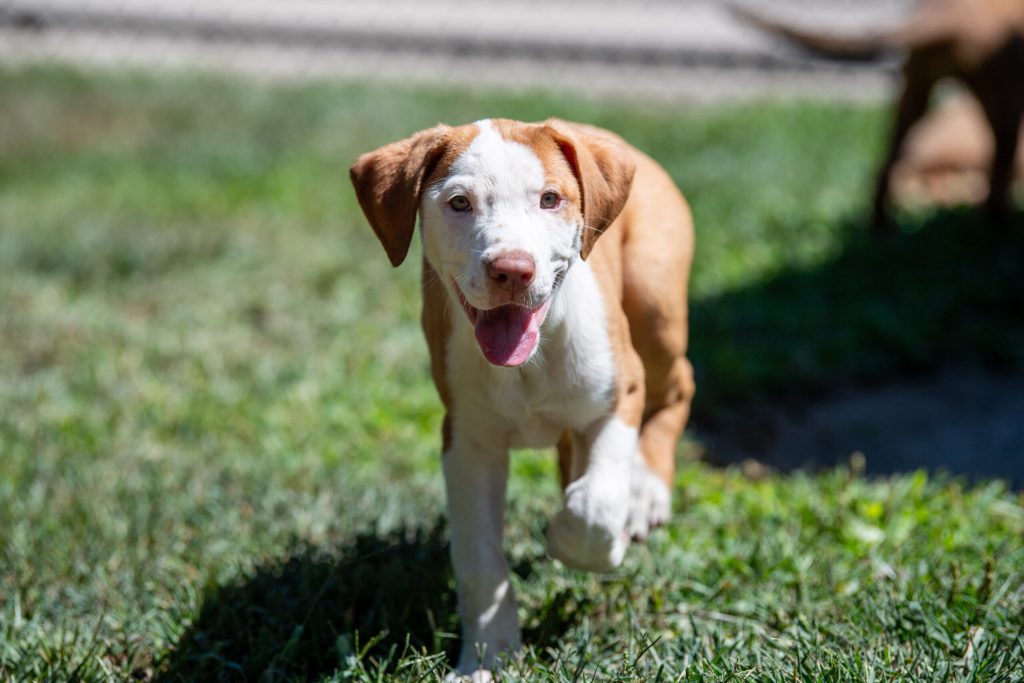The Importance of Socialization in Puppies: How to Prepare Your Dog for a World Full of New Experiences

The Importance of Early Socialization
Bringing a puppy into your home is a transformative experience, filled with moments of joy, laughter, and the occasional challenge. One of the most critical steps in nurturing a well-rounded canine companion is socialization. During the first few months of life, a dog’s brain is like a sponge, absorbing experiences that will shape its behavior. Understanding the importance of socialization and integrating it into your puppy’s routine can lead to a more harmonious life for both you and your pet.
Features of Effective Socialization
Socialization involves much more than a simple introduction to the outside world; it encompasses a range of experiences and interactions that form the backbone of a puppy’s development. For instance, when you take your puppy for walks in a busy urban environment, they encounter sounds like honking cars, laughter, and construction noises. This exposure helps them learn not to fear common city sounds and sights, ultimately fostering confidence. Conversely, quieter spaces, like serene parks, allow for gentle exploration, teaching them to enjoy and navigate less stimulating environments.
Furthermore, interactions with other animals are vital. When puppies play with older dogs, they learn vital social cues, such as how to assert dominance appropriately or submit when necessary. These social skills are crucial for their ability to form friendships and functionalities with other dogs as they grow. Well-socialized dogs tend to have more balanced temperaments, leading to a greater willingness to play or work with fellow canines.
Importance of Mixing with Different People
Equally important is your puppy’s exposure to a variety of people. This includes adults, children, and even individuals with unique traits—such as individuals with hats, sunglasses, or uniforms. Early, positive experiences will ensure that your dog is comfortable and calm during future encounters, drastically reducing the likelihood of fear or aggression. For example, allowing a puppy to interact with children not only teaches them to be gentle but also cultivates a sense of trust and comfort around younger humans.
Setting the Stage for a Lifetime of Adaptability
The benefits of effective socialization extend far beyond basic interactions. Puppies that are adequately socialized are better equipped to face changes throughout their lives, whether it’s moving to a new home, meeting new animals, or adjusting to changes in routine. They develop essential critical skills like obedience, adaptability, and communication, which are crucial not just for their own happiness but for the welfare of their families as well. A confident dog is less likely to display behavioral problems such as barking excessively, chewing furniture, or exhibiting fear-based aggression.

In summary, the first few months of your puppy’s life are a window of opportunity. Engaging them actively in their environment, introducing them to a myriad of experiences, and providing the right guidance can create a lasting, positive impact. By prioritizing socialization, you are not just nurturing a pet; you are helping to raise a well-adjusted and joyful canine companion, ready to explore the world alongside you.
DIVE DEEPER: Click here to discover more
Creating a Well-Rounded Puppy through Socialization
The process of socialization is vital to a puppy’s growth, and its effects can be seen throughout their entire life. During the first three to four months, puppies develop their initial perceptions of the world around them, making this a crucial time for shaping their behavior and responses. Hence, the importance of early socialization cannot be overstated. By focusing on how to prepare your puppy for various experiences early on, you can foster a well-adjusted dog that embraces life with open paws.
Benefits of a Diverse Socialization Environment
One of the hallmarks of effective socialization is exposing your puppy to a variety of settings and scenarios. This exposure contributes significantly to their comfort levels and aids in developing important social skills. Here are some key aspects of a diverse socialization environment to consider:
- Varied Locations: Regular visits to different locales—whether it’s a bustling dog park, a calm beach, or even a local café—allows your puppy to encounter diverse scents, sounds, and sights.
- Interacting with Different Animals: Introducing your puppy to various animals, including other dogs of different sizes and temperaments, helps them understand dog-to-dog communication and body language.
- Adapting to Various Scenarios: Engaging your puppy in scenarios they might face in daily life, such as being around strollers, bicycles, or even vehicles, is essential for building their understanding and trust in new experiences.
By fostering an environment where your puppy can engage with various elements of the world, you help establish their comfort in unfamiliar situations. This prepares them for the complexities of life as an adult dog, reducing the likelihood of anxiety-driven reactions.
The Role of Playdates in Socialization
Playdates serve as an incredible opportunity for socialization, allowing puppy owners to facilitate safe interactions between their furry friends. During these gatherings, puppies learn through play, meeting others of their kind while developing critical skills such as:
- Impulse Control: Learning to take turns and wait their mark during playtime establishes patience and self-regulation.
- Communication Skills: Regular interactions with fellow canines teach them how to express themselves, understand signals, and recognize when a friend is feeling overwhelmed.
- Confidence Building: A sociable puppy learns that new encounters can be positive, leading to a well-adjusted dog ready to tackle life’s surprises.
Accurate socialization through playdates leads to well-socialized puppies who transition into adulthood without unconscious fears or unwarranted aggression. This lifelong ability to form relationships not only impacts the dog’s happiness but also the overall quality of life for everyone involved, including their human families.
In summary, the art of socialization involves more than simply introducing your puppy to various experiences. It’s about creating an immersive learning experience that facilitates their growth into a confident, adaptable adult. By investing the time and effort to socialize your puppy effectively, you’ll be setting the stage for them to navigate the world with ease, ensuring a fulfilling companionship for years to come.
Socialization in puppies is not merely a pleasant activity; it is a crucial component for their development and long-term well-being. Early socialization plays a pivotal role in shaping a puppy’s personality and behavior. By exposing your young dog to various environments, sounds, people, and other animals, you effectively broaden their sensory experiences, which fosters adaptability and confidence.One of the key advantages of proper socialization is the reduction of anxiety and fear. Puppies are particularly impressionable in their early months, and positive interactions can help them learn to approach new situations without fear. For example, introducing your puppy to different people—children, elderly individuals, and people in uniforms—can help them feel comfortable and secure around diverse experiences. Similarly, encounters with other dogs can reduce fearfulness and aggression, enhancing their ability to play and communicate with their peers.Moreover, socialization aids in the development of essential training orienting behaviors. A well-socialized puppy tends to be easier to train in obedience, as they are less likely to be overwhelmed by distractions. Socializing during critical developmental stages also helps to instill acceptable behavior, making them less likely to develop habits that can lead to behavioral issues in adulthood.To successfully socialize your puppy, consider enrolling them in puppy socialization classes that focus on positive reinforcement. These classes allow for guided interactions with other puppies as well as exposure to various stimuli in a controlled environment. Socialization should also include regular outings to parks, pet shops, and outdoor cafes, where your puppy can observe and interact with the world at large. Each new experience serves as an opportunity for growth, ensuring that your dog is well-prepared for a vibrant, fulfilling life. In conclusion, investing time and effort into your puppy’s socialization will inevitably yield lasting benefits, producing a confident, well-adjusted adult dog capable of navigating a world full of new experiences.
GET READY: Click here for essential tips
Strategies for Success in Puppy Socialization
Successfully socializing your puppy requires intention and planning. The goal is to create a balanced mix of experiences that cater to their developing personality and specific needs. Here are several strategies that pet owners can utilize to enhance their puppy’s socialization journey:
Enrolling in Puppy Classes
Puppy training classes are particularly beneficial not just for obedience training but for socialization as well. These structured environments facilitate interactions with both humans and other puppies under the guidance of professional trainers. Classes typically focus on crucial skills such as:
- Basic Commands: Teaching commands like sit, stay, and recall helps in establishing communication between the owner and the puppy, making social interactions smoother.
- Exposure to New Stimuli: Classes often incorporate various distractions, such as sounds and movements, which help puppies grow accustomed to different environments.
- Supervised Play Sessions: Trainers usually monitor playtimes, enabling safe and controlled interactions that minimize the risk of negative experiences.
Finding a reputable puppy class in your area is straightforward; organizations like the American Kennel Club (AKC) often provide resources and listings for dog training classes throughout the United States. These classes can be an invaluable asset in your puppy’s development.
Creating Positive Experiences
To foster a love for new experiences, every outing should be treated as an opportunity for positive reinforcement. Utilize treats, praise, and toys during socialization outings to build positive associations with new encounters, ensuring your puppy views them as enjoyable. You might consider:
- Short Outings: Begin with brief visits to busy places that expose your puppy to various stimuli, gradually increasing the duration as they become more comfortable.
- Reward-Based Training: When introducing your puppy to new people or animals, reward them for relaxed behavior and gradual exploration. This tactic encourages repeat positive behavior during subsequent encounters.
- Encouraging Exploration: Allow your puppy to explore different environments at their own pace. Whether it’s sniffing curbs in a new neighborhood or meeting a friendly child in the park, encourage their curiosity.
Establishing these positive experiences will instill an internal sense of confidence in your puppy, motivating them to face new challenges in the future.
Understanding Critical Socialization Windows
The timing of socialization is as significant as the experiences themselves. Puppies have distinct critical developmental windows, primarily between 3 to 14 weeks of age, where they are particularly receptive to new experiences. During this period, an array of socialization opportunities can help shape their responses to various situations. Here’s why understanding these windows is essential:
- Early Exposure: The positive interactions within this timeframe often lead to lifelong behavioral traits. Conversely, negative experiences can result in fear or aggression in adulthood.
- Flexibility in Learning: A young puppy’s brain is highly adaptable, making it easier for them to learn and accept new environments, sounds, and even the sights of everyday life.
- The Importance of Timeliness: Delaying socialization past the critical window may lead to fearful or anxious behaviors later on, emphasizing the necessity of timely social exposure.
By understanding these critical periods, owners can tailor their socialization plans to provide the best opportunities to prepare puppies for the broader world around them.
DON’T MISS: Click here for essential tips on your pet’s oral health
Conclusion
The foundation of a well-adjusted adult dog begins with effective socialization during their formative puppy years. Understanding the importance of socialization in puppies is essential for any pet owner who wants to ensure their dog thrives in a world filled with new experiences. By exposing puppies to various environments, people, and situations, you are not just helping them develop essential social skills, but also instilling a sense of confidence that will serve them throughout their lives.
As outlined, early and positive interactions during their critical socialization windows can significantly influence their behavioral outlook as adults. Incorporating strategies such as enrolling in structured puppy classes and creating rewarding experiences turns socialization outings into joyful adventures for both you and your puppy. These proactive measures establish a well-rounded approach to preparing your dog for a world full of new experiences, which will yield long-term benefits.
Furthermore, it is crucial to remember that socialization is not a one-time event; rather, it requires ongoing commitment and adaptation as your puppy grows and encounters new situations. By prioritizing socialization now, you are not only fostering a beloved companion but also paving the way for harmonious interactions with both humans and other animals. Embrace these early experiences and make the most of the essential time you have with your puppy—doing so will lead to a happier, healthier, and more confident dog in the future.


